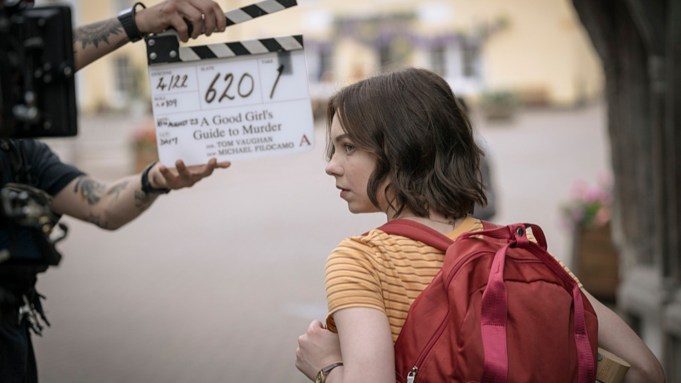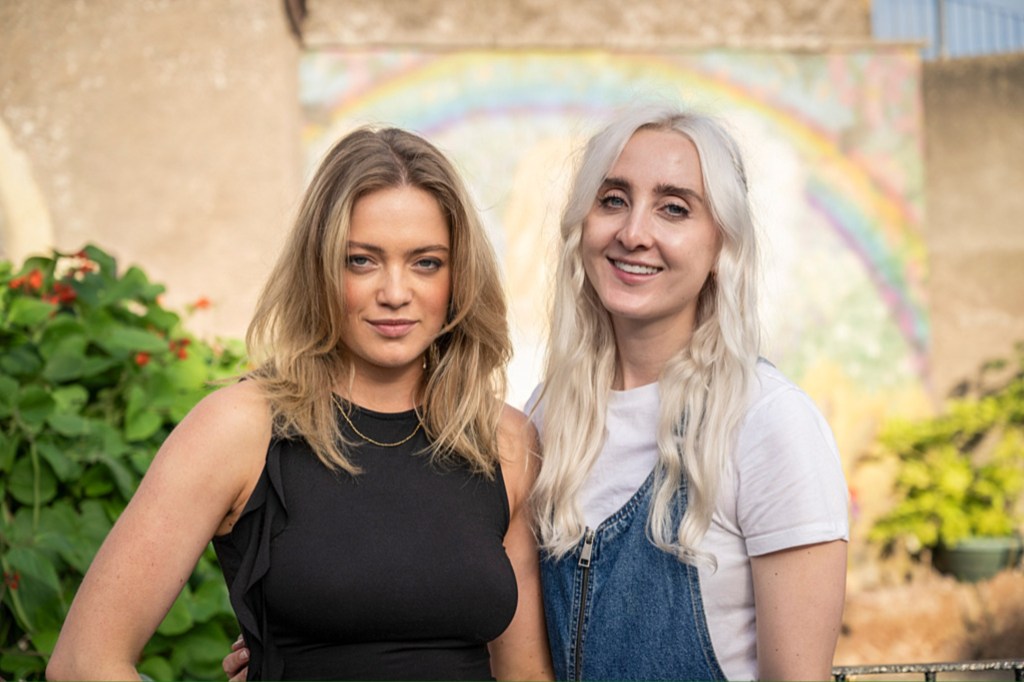
Courtesy of the BBC
SPOILER ALERT: This story contains spoilers for ‘A Good Girl’s Guide to Murder’, currently streaming on iPlayer in the UK.
“A Good Girl’s Guide to Murder,” the adaptation of Holly Jackson’s hit young adult thriller, is finally set to arrive on Netflix on August 1 after making its UK debut on the BBC last month.
Produced by Moonage Pictures (“The Gentlemen”) and starring “Wednesday” breakout Emma Myers as protagonist Pip, it follows a schoolgirl’s attempts to solve a cold case murder, putting not only Pip but also her family in danger as old secrets refuse to stay buried.
Jackson, who worked with showrunner Poppy Cogan (“Red Rose”) to bring the book to life, sat down with Variety between the UK and US shows to talk about how she came up with the idea for ‘AGGGTM’, the challenges of adapting it to the screen and what she’s working on next.
How do you feel?
The week the show came out on the BBC, I did an unofficial screening with my family and friends, we watched a few episodes and rented a cinema screen. And you know what, it’s really cool! It makes me want to keep doing this. Because you know, I love writing books, I’m going to do it for the rest of my life, but I feel like working in television and film is in my blood, so to speak. I’d like to keep doing both. This is my first series. So I’m anxious but excited.
Where did the idea for the book come from?
My little sister had just done an EPQ (Extended Project Qualification) at school – I hadn’t actually done them, I think they were the year after me – so I had that in my head. And then I had literally listened to “Serial”, I was way behind, so I was obsessed with it and suddenly I started studying true crime. I think one day I was at work, not paying attention, hiding in the supplies cupboard, and I put these two ideas together. And I thought, “Wait a minute. What if a student did their EPQ project by solving a cold case murder?” And it came to me very, very quickly. I think I wrote the whole book in about nine weeks.
How did you decide who the killer would be?
I think the biggest thing for me, having read a lot of crime TV and crime books, is that I didn’t really like stories where there was just a bad guy who did bad things because he was bad. I like stories that were a lot more nuanced than that. I’m really fascinated by the idea of nuances of morality and the question of, “Are some bad things forgivable with good intentions?” and things like that. So I knew that with our two killers, I wanted to create a kind of morally gray situation that asked the reader, “If you were in that situation, couldn’t you imagine that you might act in the same way?”
Obviously, the series has received a great response from those who have already seen it, but the only complaint seems to be some changes in the adaptation, such as some of Ravi’s dialogue being cut..
I know. Here’s the thing. I was very involved in the show. I was taking script notes all last year. I worked 24/7 on the show. The show is literally unrecognizable because of my input. If I hadn’t stepped in – I mean stepped in, I should use a better word – if I hadn’t offered my sage advice and guidance and stepped in, the show wouldn’t be what it is today. I’m proud of the show that we created, but at the end of the day, I didn’t write it. I made a lot of suggestions and said things that I thought were very important to the book fans, and that would have betrayed them if they weren’t there. And at the end of the day, it wasn’t my decision. So I completely sympathize with the book fans who wanted to see their favorite moments. And you know, I have such close interaction with readers that I already knew.
I think we found the right balance. Sometimes I think with an adaptation, it’s almost like you can’t fully please a book fan because a show can’t live up to their immense imagination. So I think I was expecting a little bit of, “Oh, the book is so much better,” which is also fine by me, because the book is mine. But I’m very aware of that, and I was aware of it before the show came out. I kind of predicted the elements that people would be disappointed not to see. So I see that as a positive: if we’re able to do more shows, I feel like I now know exactly what to do to keep book readers happy, while at the same time keeping new viewers in mind, which is sometimes a delicate balance.

Author Holly Jackson (left) with India Lillie Davies who plays Andie Bell (courtesy BBC)
As an author whose work is being adapted, it can be difficult to find the right partners to bring your book to life. Have you and showrunner Poppy Cogan had any conflicts?
I think it was probably during one of the COVID lockdowns, I was sent a pilot out of the blue. And it wasn’t what I wanted and we wavered a little bit on the pilot. I think at that point the production company I was working with realized that it was interesting to get me more involved because my ideas were good.
We worked a lot back and forth. Sometimes you’re like, “Oh, I wish I could write the scripts myself.” But it’s not just me and Poppy, it’s all the producers, it’s our broadcasters. It doesn’t just take a village, it takes a continent to make a TV show. But I think we came up with a good result. And I think everyone involved can be proud of the show that we’ve created in the end.
What didn’t you like about this first pilot episode?
It wasn’t really an adaptation of the book. It was way too different. The characters were invented, they didn’t follow the book at all. I just made it very clear at that point that if they didn’t want to adapt the book as an adaptation, I could do it somewhere else. Because at that point, we were in a very different position. I sold them the option before the book came out and at that point, the book was already a bestseller in America and the UK and we were constantly getting offers from other production companies who wanted to do the series. So I think that put me in a position where I could say, we have to do this right and you have to do it right or we’ll do it with someone else who will do it right. After that, we were able to wipe the slate clean and say, OK, we have to get much closer to the book. The fans of the book don’t even know what could have happened, what I saved them from!
Can you tell me about the scene where Pip is almost murdered and why it was changed for the screen?
The thing is, with a book, I can do whatever I want, there’s no budget. So in the book, the final scene, what happens is they’re at the Bells’ house, and then they’re in the forest next door, and it’s nighttime. It’s November 5th (fireworks night in the UK), so there’s a big fireworks display in town with amusement park rides and all that. And we didn’t have the money to do that. Night shoots are very expensive, fireworks would have been expensive. So it was kind of a necessity, but also because we found these caves that we shot the Calamity party in – which, again, is technically helpful because you can shoot during the day, it doesn’t have to be at night. And we knew that when we did our final scene, we wanted to go back to a place that you had already seen in the series, so the caves were the obvious choice.
What are you going to work on next?
I have a horrible document staring me in the face, it’s my line edits for an unannounced upcoming book, so I’m procrastinating a lot. That’s what I’m hiding from right now. I have so many secrets that I can’t afford to make a mistake. So know that I’m working hard but I can’t tell you anything!
And finally, any news on season 2 of “A Good Girl’s Guide to Murder”?
I don’t know yet and I don’t know how long I’ll have to keep it a secret before it’s announced publicly. But I hope the gap between when I find out and when everyone else finds out isn’t too big, because I hate keeping secrets!